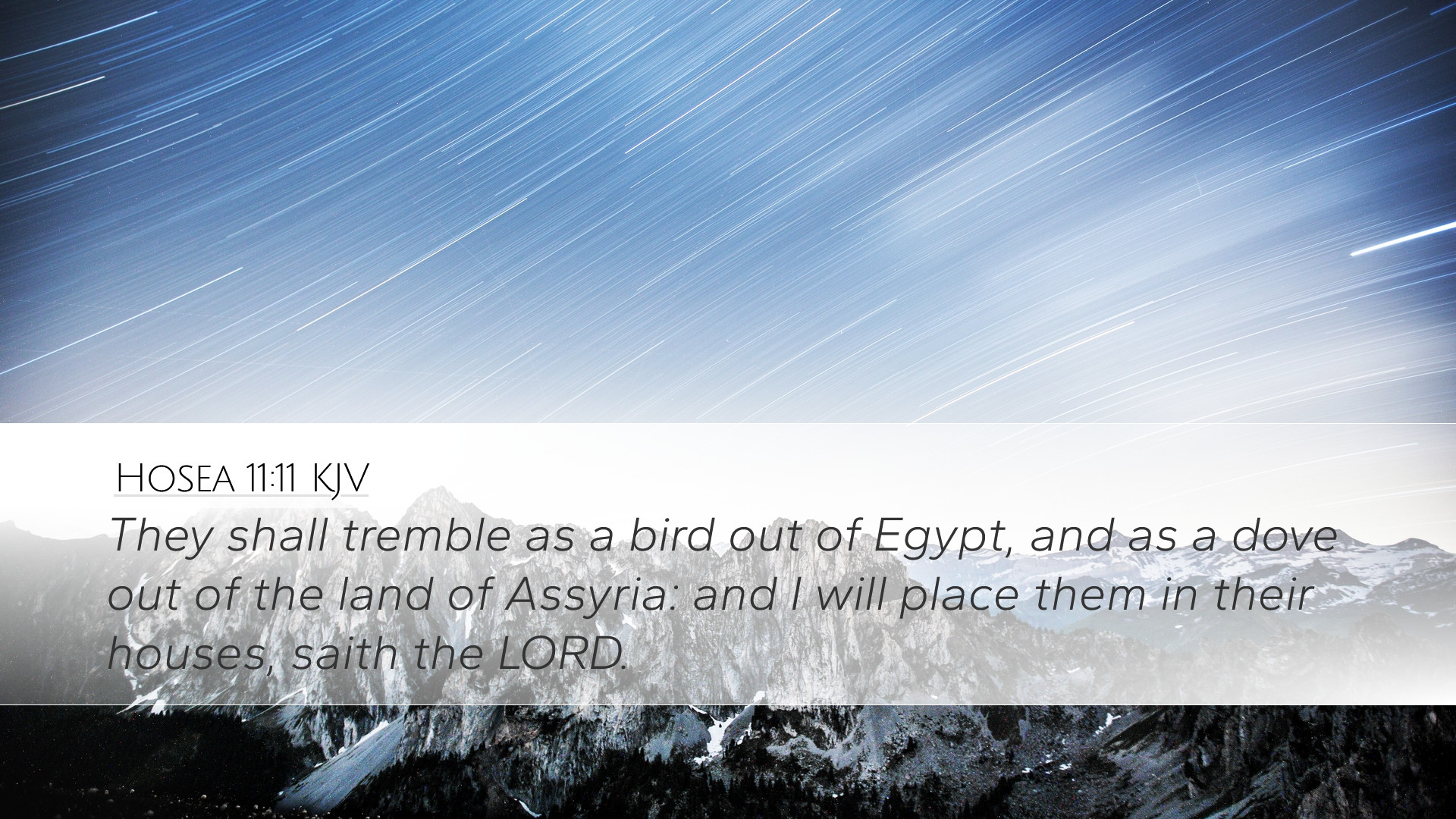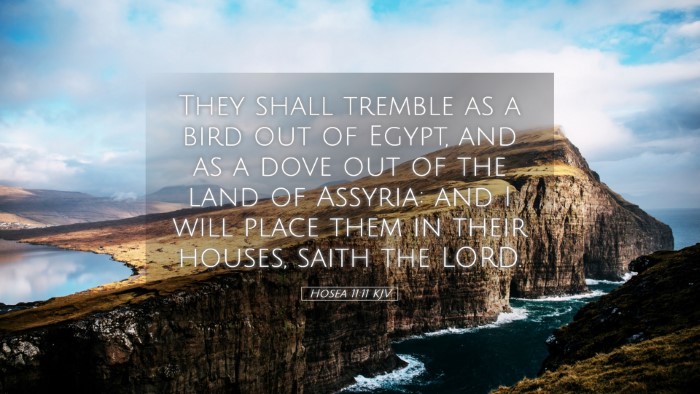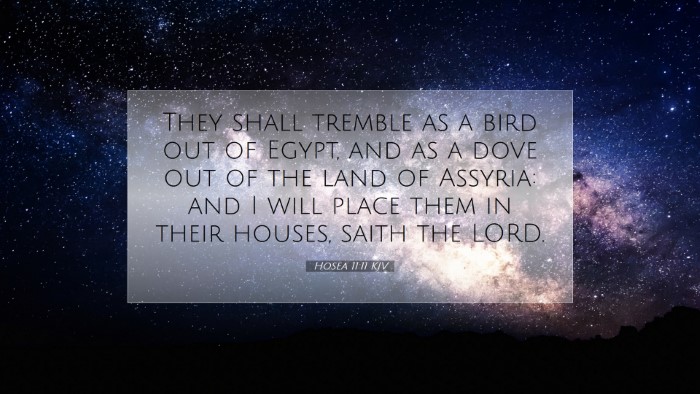Old Testament
Genesis Exodus Leviticus Numbers Deuteronomy Joshua Judges Ruth 1 Samuel 2 Samuel 1 Kings 2 Kings 1 Chronicles 2 Chronicles Ezra Nehemiah Esther Job Psalms Proverbs Ecclesiastes Song of Solomon Isaiah Jeremiah Lamentations Ezekiel Daniel Hosea Joel Amos Obadiah Jonah Micah Nahum Habakkuk Zephaniah Haggai Zechariah MalachiHosea 11:11
Hosea 11:11 KJV
They shall tremble as a bird out of Egypt, and as a dove out of the land of Assyria: and I will place them in their houses, saith the LORD.
Hosea 11:11 Bible Commentary
Commentary on Hosea 11:11
Bible Verse: "They shall tremble as a bird out of Egypt, and as a dove out of the land of Assyria: and I will place them in their houses, saith the LORD."
Introduction
The book of Hosea, a profound work within the Minor Prophets, provides rich theological insights into God's relationship with His people, Israel. Hosea 11:11 serves as a pivotal verse that encapsulates themes of restoration and divine compassion. By examining this verse through the lens of esteemed public domain commentaries, we can uncover layers of meaning that hold significance for pastors, students, theologians, and Bible scholars.
Contextual Background
Before diving into the specifics of Hosea 11:11, it is essential to understand the context surrounding this text. Hosea prophesied during a turbulent time in Israel’s history, marked by socio-political instability and spiritual decline. This backdrop is critical as the prophet conveys God's yearning for reconciliation despite Israel's unfaithfulness.
Insights from Matthew Henry
Matthew Henry, in his comprehensive commentary, draws attention to the imagery used in this verse. He notes:
- The bird out of Egypt symbolizes the people of Israel, who were brought forth from Egyptian bondage—a significant historical reference that affirms God's deliverance.
- The dove from Assyria represents a gentler aspect of God’s people, as doves are often seen as symbols of peace and innocence.
Henry emphasizes the merciful character of God who desires to gather His people despite their waywardness. He highlights that the return mentioned in this verse is not merely a physical restoration but a spiritual one, indicating a turning back to God in faith and obedience.
Albert Barnes' Perspective
Albert Barnes offers a theological reflection on the significance of God’s promises in Hosea 11:11. He elaborates on the meaning of the phrase "they shall tremble." Barnes interprets this trembling as a sign of fear or anxiety that drives the Israelites back to their Redeemer:
- Their migration from foreign lands (Egypt and Assyria) is not just a return to their homeland but signifies a spiritual awakening.
- He emphasizes the sovereignty of God in orchestrating the return of His people, presenting it as a beautiful act of divine love and grace.
Barnes stresses that God's intention in this restoration is to establish a lasting peace among His people, free from the fear that once plagued them as they wandered in exile.
Adam Clarke's Contributions
Adam Clarke’s commentary dives deeper into the linguistic and cultural aspects of the verse. Clarke points out:
- The use of tremble connotes not merely fear but a sense of apprehension that leads to repentance and returning to God.
- He notes the significance of land of Assyria as a representation of oppression and idolatry, contrasting this with the notion of returning to God’s protection at home.
Clarke highlights that God’s promise to place them in their houses symbolizes security and the restoration of covenantal relationship, an essential theme for understanding the depth of His grace toward a wayward nation.
Theological Implications
Combining insights from these commentaries, we discover key theological implications of Hosea 11:11:
- God’s Faithfulness: Despite Israel's rebellion, God remains steadfast in His commitment to restore His people.
- Repentance and Renewal: The imagery used reveals the necessity for Israel (and the church today) to return to God, demonstrating that restoration comes through repentance.
- Divine Sovereignty: The act of gathering and placing indicates God’s control over history and His ability to orchestrate events for the ultimate good of His people.
- Symbolism of Birds: The metaphor of birds signifies vulnerability and silence, suggesting that God invites His people into a space of refuge and safety.
Applications for Today
This verse and its commentary provide rich applications for contemporary believers:
- Encouragement in Trials: Just as Israel faced turmoil, modern believers can find hope in God’s promise of restoration in their trials.
- Call to Repentance: The trembling of the people symbolizes the necessity for us to encounter our failures honestly and return to God.
- Celebration of God’s Mercy: The divine invitation to return should inspire gratitude for God’s enduring patience and relentless love.
- Importance of Community: God’s promise to place them in their houses shows the importance of communal faith and the need for believers to support one another in their journeys.
Conclusion
Hosea 11:11 serves as a powerful reminder of God’s compassionate desire to gather His people and restore them to Himself. The insights garnered from public domain commentaries amplify our understanding of this profound text, offering theological richness and practical applications that resonate with our faith journeys today. As we contemplate God’s promises, let us be encouraged to ‘tremble’ with reverence and return to our faithful Creator, trusting in His sovereign plans for restoration and peace.


